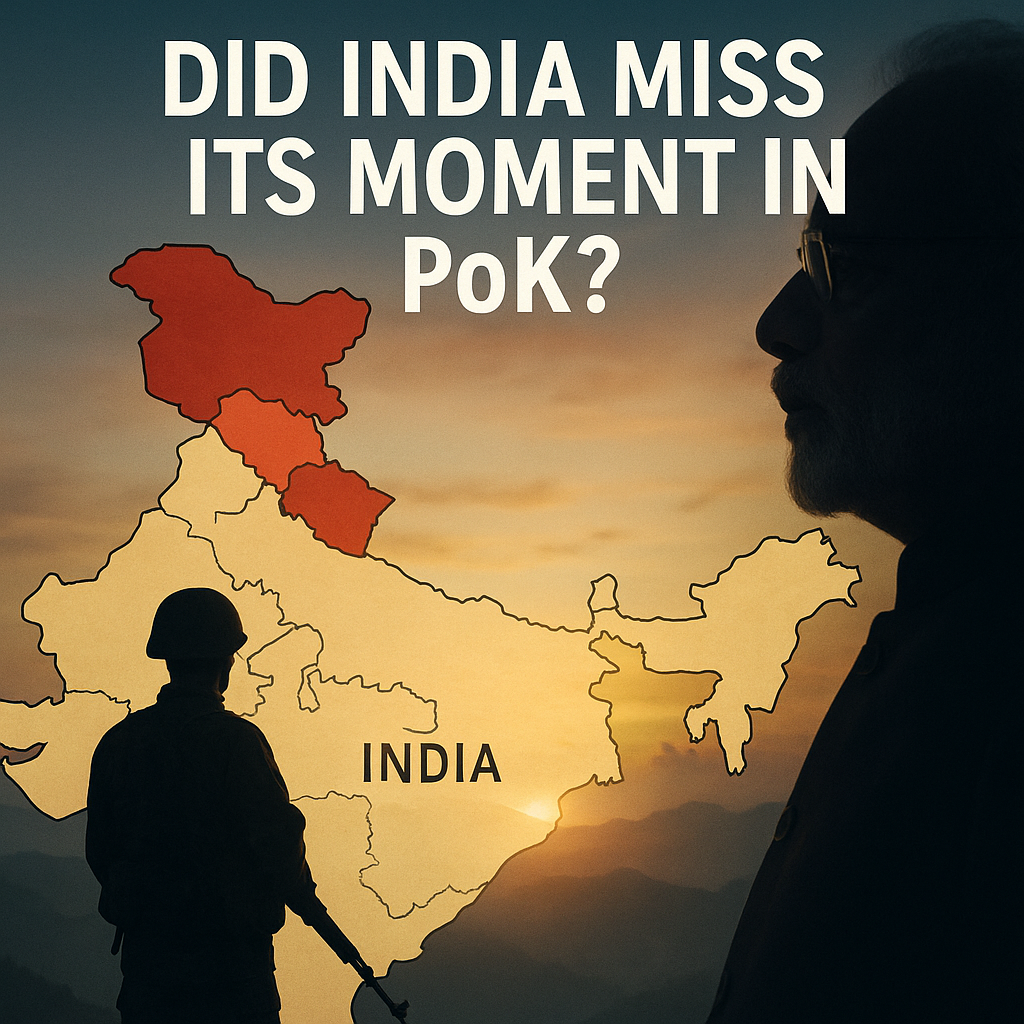Did India Miss a Strategic Opportunity in Pakistan-Occupied Kashmir?
India had the opportunity to teach Pakistan ,The problem of Pakistan-Occupied Kashmir (PoK) is very delicate and deeply ingrained in the unstable geopolitics of South Asia. India has taken a more proactive stance on global and national security issues during the last ten years, particularly under Prime Minister Narendra Modi’s direction. New Delhi made it clear that it was no longer satisfied with merely voicing diplomatic opposition to cross-border terrorism and aggression through surgical strikes and the Balakot attacks.
India had the opportunity to teach Pakistan ,However, a new query has begun to emerge in strategic circles and among an increasing number of Indian citizens: Did India just pass up a crucial chance to regain the PoK? If so, what caused it to retreat?
The Strategic Context, India had the opportunity to teach Pakistan
In recent months, tensions in Pakistan have been escalating. Islamabad is under a great deal of internal strain because to political unrest, economic instability, and growing dissatisfaction in areas like Khyber Pakhtunkhwa and Balochistan. When you combine this with the growing disenchantment in PoK itself, where many residents complain about Pakistan’s leadership, it seemed, at least from a distance, that the time was right for India to take a risk.
Following the 2019 repeal of Article 370, Indian soldiers were reportedly on high alert, according to media sources and some defence analysts. Jammu and Kashmir’s standing within India was drastically altered by the action, which also rekindled discussions about regaining PoK, an area that New Delhi has long maintained is an essential component of the Indian Union.
India’s military and diplomatic efforts were stretched across both its eastern and western frontiers in 2020 and 2021 as China pushed into Eastern Ladakh and Pakistan struggled with internal issues. Nonetheless, there were rumours in defence corridors that India might have used Pakistan’s weakness to retake land in the PoK, particularly because the Line of Control (LoC) was still exceptionally tense but motionless.
A Moment Passed?
The uncommon combination of diplomatic cover, regional instability in Pakistan, and great military preparation on the Indian side, according to critics, may have made this the best window in decades. They contend that in order to regain important areas of the PoK, especially the Gilgit-Baltistan region, which is essential to the China-Pakistan Economic Corridor (CPEC), New Delhi might have launched a small but targeted operation.
Proponents contend that India might have permanently altered the narrative around Kashmir if it had taken decisive action, particularly during a period when the pandemic, attempts at economic recovery, and shifting political alliances around the world had mainly distracted attention from the issue.
However, that pivotal action never materialised.
Why the Modi Government Held Back
This time, the Modi government opted for moderation in contrast to its previous harsh rhetoric and daring military acts. This could be due to a number of factors.
India had the opportunity to teach Pakistan , International diplomacy comes first. India has put a lot of effort into establishing itself as a responsible participant in the world. Even if defended by strategic need, launching a robust military campaign might have drawn international censure, especially from the UN and Western allies.
Second, it is impossible to overlook the China issue. India probably reasoned that establishing another active front in PoK would be both economically and militarily dangerous, given the presence of Chinese forces in areas of Eastern Ladakh and the possibility of a two-front conflict.
Domestic priorities come in third. Like a large portion of the world, India was coming out of the COVID-19 pandemic’s shadow. The government may have determined that launching a military campaign at this time would be politically risky given the need to revitalise the economy, prepare for elections, and deal with an already divisive political environment.
Finally, India had the opportunity to teach Pakistan ,there is the humanitarian and moral aspect. In addition to being a military operation, occupying the PoK would require overseeing a region riven by strife, dealing with a possibly hostile populace, and navigating intricate international humanitarian duties.
Nationalist Sentiment vs. Strategic Restraint
Nationalistic discourse has never been avoided by the Modi administration. Party platforms and political stages have made pledges to retake PoK. Supporters believe that the current display of restraint betrays those pledges. Critics see it as just another instance of exaggerated hyperbole that doesn’t reflect actual conditions.
India had the opportunity to teach Pakistan ,However, some contend that exercising restraint is also a sign of strength. Long-term posture, strategic patience, and measured diplomacy may be more effective than an impetuous display of power.
What Lies Ahead?
India had the opportunity to teach Pakistan ,The PoK problem has not yet been resolved. In actuality, it continues to be crucial to both New Delhi’s long-term goals for Jammu and Kashmir and India-Pakistan ties. The political and military developments in the area over the next few years will determine whether this lost chance becomes a watershed in history or only a footnote.
The window appears to have closed for the time being. Along with it came a chance that might have changed the subcontinent’s geographic layout, but perhaps at a price India was not yet prepared to pay.

[…] India had the opportunity to teach Pakistan a lesson but backed down, and the Modi government lost … […]